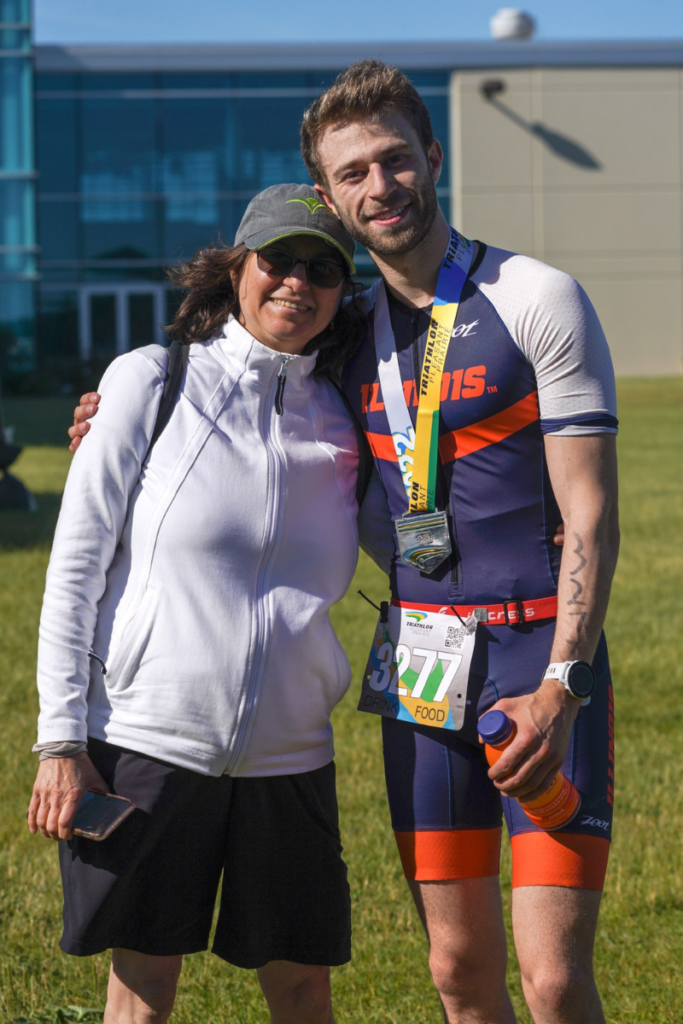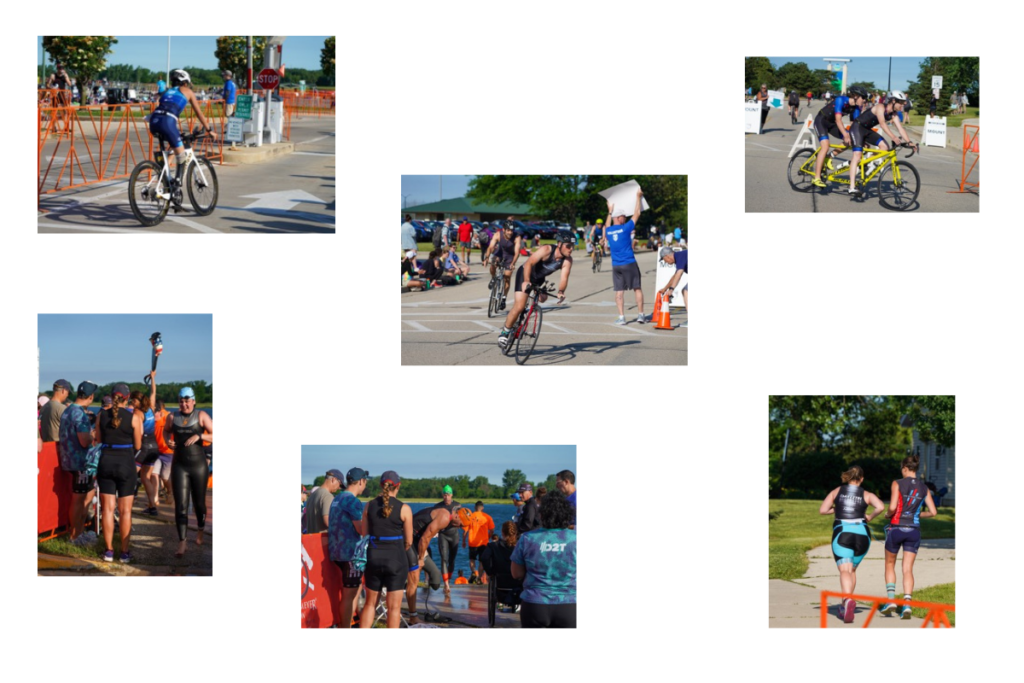In June, my son Drew participated in the Pleasant Prairie, Wisconsin sprint triathlon.
It was a beautiful, sunny morning in the low 70’s. We arrived very early in the morning at 5:30 am for packet pick up and set up in the transition area. Drew began his race at 7:15 am and finished up just over an hour later, taking 8th place in his age group. Gone are the days of winning 1st place, as now he is in an older, more competitive age group and after taking the past two years off of intensive training, Drew is now back in the swing of things and ready to compete. Look out at the next race!
Para-Athlete Turnout
I have been to many of Drew’s triathlons but this one really stuck out with the amount of para-athletes. A para-athlete is a person with a physical disability such as an amputation, paralysis, blindness or intellectual impairment such as autism.
There were two para-athlete organizations represented at the race supporting their athletes: Dare 2 tri and My Team Triumph. The volunteers assisted and guided their athletes through the triathlon.
The athletes had varying disabilities with varying needs. We saw:
- Multiple amputees running with the prosthetic blade. Sidenote: I am amazed at this technology as it did not exist when I went to school
- Disabled athletes being carried into the water (as you don’t need to use your legs to swim) and then being carried out of the water to their wheelchairs or forearm crutches
- An athlete with one arm
- Amputees biking with their prosthetic leg
- Amputees biking without their prosthetic leg
- Blind athletes with a guide tethered to them in the water and on the run and they rode on a tandem bike
- Swimmers tethered to a boat with a disabled person in the boat
I couldn’t help but think that any one of these athletes could have been a patient of mine.
Emotional Healing Process
Let me explain:
When I first begin working with a patient through their rehab process, I often use basic psychology skills to encourage and reassure the patient that they will get better. That is, I help them gain confidence that they’ll once again be able to return to an active life. I coach them through the healing process which involves accepting that the outcome may be different — or even better — than they can imagine. But it takes time.
Healing After Surgery
Immediately after an injury or surgery, your body goes through normal healing responses of inflammation, edema (swelling), and pain which limits your mobility. Healing of any tissue in the body will always take anywhere from 4 to 8 weeks — or longer. It’s just the way nature is.
I met a man at an event last week who was still recovering from elbow surgery after 6 weeks. He commented that it didn’t make sense to him that, as a healthy young man, he had the same therapy protocol as an older person. As such, he was doing some advanced exercises with his arm that he probably shouldn’t have been doing yet.
After surgery, in addition to tissue healing, it may take a few weeks just to recover from the anesthetic. Scar tissue will form from the surgery and continue to grow if not addressed. Movement as soon as possible after surgery is very important to promote blood flow, balance, respiration, normal blood pressure, and to prevent blood clots and pneumonia.
There may be limitations depending on the injury or surgery, such as a fracture limiting the mobility of that particular joint near the fracture. If someone has had an issue with their leg — whether it be at the hip, knee, or foot — the person may require the assistance of a walker or a cane to promote normal gait, safety and prevent pain when stepping on the involved leg.
Healing Takes An Emotional Toll
All this to say that healing is a process. It takes time and is emotionally challenging for many patients.
Patients often experience a myriad of emotions:
- Incredulity: “I thought I would be all better by now”
- Sadness: “I’ll never be able to do what I used to do”
- Anger: “why aren’t I better already? There must be something else wrong”
- Victim: “I used to be so buff, now I’m so out of shape”
- Denial: “I can walk without a walker”
- Remorse: “maybe I shouldn’t have had that surgery”
- Fear: “I’m afraid of pain; I’m afraid I’ll never be like I was before” “I’m afraid to move”
- Disbelief: “But it’s been years since I had surgery, injury, etc. . Why am I still having problems?”
- Delusional: “I used to be a great tennis player, runner, etc. – why can’t I do what I used to do 20+ years ago?”
- Comparison: “my neighbor did better than me after knee surgery”
- Overwhelm: “I’m overwhelmed trying to get back to my old self”
- Discouraged: “Every time I increase my activity my pain returns”
- Catastrophizing: “I’ll never be better”
This is because, in addition to the current injury or issue and the emotional responses to it, every patient also has former experiences — medical, psychological, emotional, or trauma — as well as social and family issues that also come into play.
Trust The Process
I see patients anywhere from 1 to 3 times per week and they often talk about their concerns and fears.
A major part of my job is to provide encouragement and education about the healing process, motivation, and — most importantly — just listen to their concerns. More than once I have had a patient accuse me of also being their mental health therapist! 🙂
Even though I can’t predict the future, I know from experience and scientific knowledge what the potential futures of my patients will be. I spend a great deal of time repeating what the healing process is and what their future will and could look like. I remind them that they might even be better than they were before — they just need to trust the process.
While in Wisconsin, I observed the para-athletes enter the water without a leg or an arm or with the complete inability to use their legs, blind, autistic, or some other disability. I couldn’t help but think that these athletes must have gone through a similar emotional roller coaster as all of my patients do. Eventually they must have trusted the healing process by not letting their limitations define them, accepting their new body, and committing to embracing life.
Have you had an experience where you never thought you’d never be able to do the things you used to do? Drop us a note at info@themanualtouch.com — we’d love to hear your story!








Leave a Reply